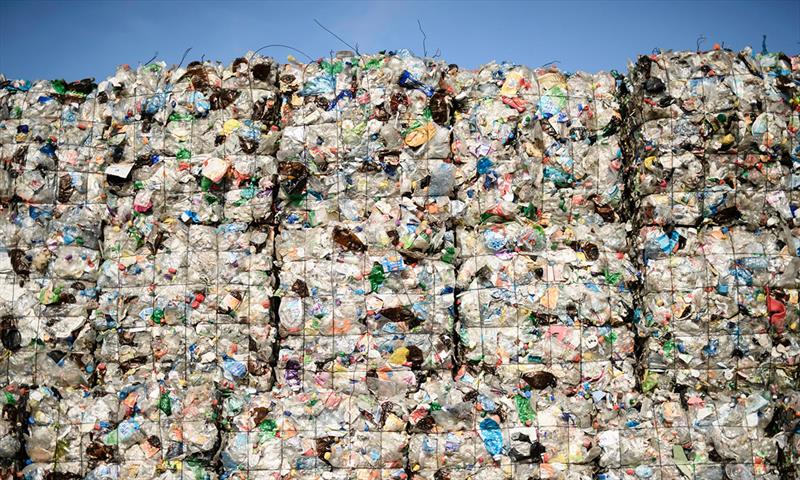
Plastic Waste - Where to from here?
by Jack and Jude 29 Jun 2019 06:19 BST

Only 9% of plastic has ever been recycled © Clemens Bilan / EPA
Efforts to be eco-friendly seem to have gone to waste as many communities find themselves with nowhere to send their plastic refuse, making it terribly sad for those of us who want to do our bit to save Earth and have been collecting our plastic waste, sorting it, and cleaning it with the inner glow that it will be recycled - And now learning that nearly half is becoming just more landfill!
It's a fact, mixed plastic isn't recyclable. As a society, we have been merrily using plastic just about everywhere thinking it would be recycled. Making it worse, manufacturers have doubled up on the stuff with that in mind. But now, No one wants the stuff! Except the impoverished, who burn it for fuel, releasing horrible toxins. Another fairy-tale blown out the water by human-kind's reckless grip on reality.
Macquarie Harbour Fish Farm trash update
The War on Waste has awoken many of us to the tragic side of plastic. But Jack and Jude are no-strangers to this. These last fifty years we've been seeing increasing human trash on the shores and seas, and on very isolated isles and atolls. Therefore it shouldn't be surprising that we've been rising the alarm about plastic fish farm trash in Macquarie Harbour, which is a very special case for several reasons. One is that it's World Heritage, an area of significance legally protected by international treaties. And secondly, it's a nearly closed body of water that little escapes. And that's an interesting point. What we are finding in Macquarie Harbour illustrates just how much plastic waste escapes from fish farm leases. What we see in that nearly landlocked harbour represents what is escaping from all the other farm leases and gets washed away into the wider seas. Of the fish farms In Macquarie Harbour, Tassal have been in operation since 1986. We'll get to that in a moment.
Macquarie Harbour Farms represents all fish farms
Shifting attention to Macquarie Harbour with its insidious problem of fish farm ropes breaking down into micro-plastic, we received an update from the head of Tassal's Aquaculture, Mr. Mark Asman.
In an email he told us that he'd gone to Macquarie Harbour and walked the shores of Brisbane Bay at the location of our last expose on Fish Farm Trash, and had seen various pieces of debris. And that he has been told the amount of debris is declining (with each successive effort), but it needs continuous effort to get where we want.
He wrote, "So the plan will be to 1. Keep on the culture side by "stopping it at the source" (we think this is having a real impact, just takes time), 2. Continue the regular shore line clean ups by the staff and others and 3. Working on a solution like you mention, a permanent crew to walk the shore lines...I hope to have more clarity on this when you return."
That sounds encouraging. And we sure hope it happens and is not just illusory promises. Mark has been talking about "changing the culture" from our very first conversation.
In replying to Mark's email, we pointed out that Tassal has been in the fish farming business since 1986. That's thirty-three years. And that Tassal employs 1261 people. We know many and they are good people who work hard to produce farmed salmon at approximately 20 leases in six regional areas within Tasmania. Tassal is a public company listed on the ASX. In 2017, Tassal earned a NET profit of A$58.08 million, that's the net increase in shareholders' equity.
Sustainability
Tassal prides itself on not only what it produces but how it produces it. Check out their website. "Our consumers can be confident that the Tassal Salmon has been raised by an environmentally and socially responsible company." In July last year, Tasmania's Department of Primary Industries (DPIPWE) introduced a "zero tolerance" for marine debris. And that for a company claiming such high environmental standards, achieving "zero tolerance" for marine debris should rank above all else.
In our email to Mark, we mentioned that what we recorded in Macquarie Harbour these last couple of years would have been going on for many years at every fish farm lease. The difference? - All that trash floated away across the oceans.
And we had some proactive suggestions to reduce fish farm trash:
- permanent crew walking the shores collecting trash
- lengthened the soft eye net ropes so they can be secured to the pens - many blow away
- filter out the micro-algae when cleaning the nets instead of releasing it to drift round the harbour (the gunge)
- filter out the molluscs when cleaning the nets instead of releasing them back into the harbour
This article has been provided by the courtesy of
jackandjude.com